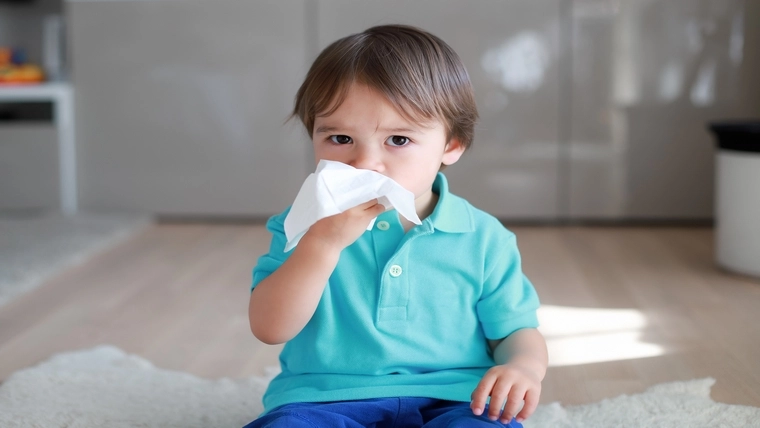
What is the Pediatric Allergy Unit?
The Pediatric Allergy Unit is a specialized health service unit that diagnoses, treats and monitors allergic diseases seen in children. This unit plays a critical role in combating allergic diseases that are frequently encountered in childhood and significantly affect quality of life.
According to data from the World Health Organization (WHO), approximately 30-40% of children worldwide are affected by one or more allergic diseases.
The Pediatric Allergy Unit plays a vital role in the management of childhood allergic diseases. With early diagnosis and appropriate treatment, it is possible to control these diseases and improve the quality of life of children. It is important for parents to consult a Pediatric Allergy specialist without delay if they observe the symptoms mentioned above.
About the Pediatric Allergy Unit
The Pediatric Allergy Unit is a unit specialized in pediatric health, providing services with a multidisciplinary approach. This unit is equipped with advanced technological equipment for the diagnosis of allergic diseases and is managed by an expert staff.
This unit manages and controls allergic reactions in children caused by overreactions of the immune system. Common allergic diseases include asthma, eczema (atopic dermatitis), food allergies, allergic rhinitis and drug allergies.
Who is a Pediatric Allergy Specialist and What Are Their Duties?
A pediatric allergist is a physician who has received special training in allergy and immunology after completing his/her pediatric training. These specialists specialize in diagnosing and treating allergic diseases in children.
The duties of a pediatric allergist include:- Performing and interpreting advanced tests for the diagnosis of allergic diseases
- Creation of personalized treatment plans
- Allergy vaccines (immunotherapy) applications
- Patient and family education
- Development of allergy prevention strategies
What are the diseases treated in the Pediatric Allergy Unit?
Various allergic diseases are treated in the Pediatric Allergy Unit.
The main diseases are:- Asthma: A respiratory disease caused by chronic inflammation of the airways, characterized by shortness of breath, cough and wheezing.
- Allergic Rhinitis (Hay Fever): It is a disease characterized by sneezing, runny nose and nasal congestion, resulting from hypersensitivity of the nasal mucosa to allergens.
- Atopic Dermatitis (Eczema): It is a chronic skin disease characterized by dryness, itching and redness of the skin.
- Food Allergies: Allergic reactions that occur as a result of the immune system overreacting to certain foods.
- Drug Allergies: These are hypersensitivity reactions that the body shows against certain drugs.
- Urticaria (Hives): A skin condition characterized by itchy, red or flesh-colored bumps that appear suddenly on the skin.
- Anaphylaxis: A severe and rapid-onset allergic reaction that can be life-threatening and develops as a result of exposure to an allergen.
What Are Pediatric Allergy Examinations?
The main examinations and tests performed in the Pediatric Allergy Unit are:
- Skin Prick Test: It is a test applied by dropping various allergens on the surface of the skin and lightly scratching it. It is used to determine the presence and severity of an allergic reaction.
- Specific IgE Blood Test: A blood test that measures the level of IgE antibodies produced against specific allergens in the blood. It is helpful in determining sensitivity to specific allergens.
- Patch Test: This is a test used to detect delayed-type allergic reactions. Suspected allergens are applied to the skin and checked for a reaction after a few days.
- Spirometry (Respiratory Function Test): A test that measures how much air the lungs can take in and release and how fast the airflow is. It is used to diagnose and monitor respiratory diseases such as asthma.
- Provocation Tests: These are tests that evaluate the presence and severity of an allergic reaction by exposing the allergen under controlled conditions. They can be applied to food, drug or respiratory allergens.
- Component Tests: These are advanced tests that measure IgE antibodies against specific allergen proteins. They help predict the severity of an allergic reaction and identify cross-reactions.
These tests play an important role in the diagnosis and follow-up of allergic diseases in children. The doctor determines which test to use based on the child's symptoms and clinical condition.
When Should You Go to the Pediatric Allergy Unit?
Situations where you should consult the Pediatric Allergy Unit include important symptoms for your child's health. Respiratory symptoms such as recurrent or prolonged cough and wheezing, frequent sneezing, runny or stuffy nose may be signs of an allergic condition. Skin reactions such as itching, redness or rash are also important symptoms. In addition, a specialist should definitely be consulted in case of allergic reactions that occur after certain foods or suspicion of a drug allergy. It is vital to contact the Pediatric Allergy Unit, especially for children with a history of anaphylaxis. When you observe any of these symptoms, it is recommended that you consult a Pediatric Allergy specialist as soon as possible for the health of your child.


